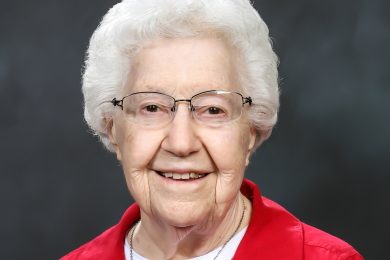By Charlie Camosy | OSV News
As Catholics become more attuned to bioethical matters, interest in working with physicians who understand how one’s faith is integral to how one understands treatment for illness, and why morality matters when deciding to accept or decline particular treatments. It is not always easy to find a doctor who will respect one’s faith while addressing medical matters. Kathleen Berchelmann, M.D., a Catholic pediatrician, mother of seven and founder of My Catholic Doctor, talks with Charlie Camosy about the numerous (and sometimes repellent) challenges doctors face, even when they want very much to treat the whole patient before them.
Charlie Camosy: Can you tell us a bit about the path that led you to becoming a physician and to founding My Catholic Doctor?
Dr. Kathleen Berchelmann: Have you read the stories of other founders, other people that have started faithful organizations? There are a few things all the stories have in common. It’s true, even when you look back thousands of years or even just 10 years. Each of these people experiences a clear calling to do what they do, and they make their fiat, they say yes to God. And then they encounter significant suffering and hardship, usually including humiliation. Our story is no different.

But it has been a joy over the past few years to finally do what we set out to do — to make Catholic healthcare accessible to everyone by creating financially sustainable models of faithful Catholic healthcare. In this way, we allow all of our staff and clinicians to answer the call of Jesus Christ in Luke 10:9, when he said, “Cure the sick who are there and say to them, ‘the Kingdom of God has come here to you.’ ”
Camosy: What is the biggest ethical problem you’ve found in the health care system today?
Dr. Berchelmann: The most common ethical problem encountered by a faithful Catholic clinician is not abortion, euthanasia, contraception, or LGBTQ issues. These are very important issues. But for most of us, these are not the most common ethical issues we face.
The most common issue we face is whether we choose to be present to a suffering patient or make more money. Similarly, we often must choose whether we should provide thorough care or make more money.
Why? Because most clinicians in the United States are in employed positions and are paid based on a patient volume model. It’s called an RVU model — RVUs stands for revenue value units.
I will bore you with the details of this later, but here’s the idea: a doctor has to see a certain number of patients to make their base salary, and then, if they see a higher volume, they get bonuses. The bonuses usually increase in an exponential fashion, not a linear fashion. So, clinicians are pushed to work as fast as they can all day, every day.
You get more RVU credit for seeing multiple quick patients than one patient that takes a long time. You do get a little bit of extra review credit if your patient is complicated, but not much. You make more money if you see a lot of patients. And if you can see a lot of complicated patients quickly, you’ve made the most money.
But you don’t have to be thorough with your patients — just the quickest job is all you need to do to get credit. This is why so many people are complaining that their doctor doesn’t really know them anymore, doesn’t really take care of everything, is in and out of the room in just a few minutes, etc.
But the most concerning problem is how clinicians often avoid patients who will be time-consuming. You will get paid less and possibly miss your bonus if you pick up patients that are emotional, talkative, cognitively limited, or in any way take longer to care for.
Camosy: That’s a disgusting and toxic system. Is this really the case in Catholic health care systems and hospitals as well?
Dr. Berchelmann: Yes. I used to work in a pediatric emergency room at a Catholic hospital. There would be three or four clinicians sitting at the ER desk, scanning the list of patients that are waiting. Critical patients were always seen first, of course. But otherwise, everyone avoided the patients that would be a “time sink” — the crying mom with a new baby that was struggling to breastfeed, the person that needed a translator, the mentally ill patient, the cognitively disabled person, the child with multiple disabilities on a ventilator. Why? The problem is that you might not make your bonus if you pick up these patients.
The centers for Medicaid and Medicare have set up standard billing codes, called CPT codes, for types of patient encounters. And each CPT code also has an associated RVU value.
RVU models give a clinician a certain number of RVU credits for every CPT code they bill. You get the most RVU credits for seeing complex patients quickly. If a patient is time-consuming, there is a way to get credit for spending a lot of time and charting this in the medical record. And you can get extra credit for things like using a translator. But you only get a little bit of extra credit. You’ll still make more money if you can avoid picking up time-consuming patients.
The same thing is true about being thorough. If I spend time counseling a family about the risks and benefits of each vaccine and answering all of their questions, I will make less money than if I just say a few words about vaccinations.
Many reimbursement structures take into account patient reviews and ratings. You can lose money if you get low ratings. And you can get a bonus if your ratings are high. But there is no bonus for practicing excellent medicine and keeping up in your field.
So, no clinician wants to pick up the patient who’s angry and complaining from the time they walk in the door. That is a guaranteed complaint. And you definitely don’t get any bonus points for listening to them and being kind and taking good care of them.
And if you refuse to prescribe narcotics to a narcotic addict, they’re probably also going to complain. And you’ll get paid less.
Basically, if you see lots of patients and not many complain, that’s how you make money. You don’t make money by providing excellent care. And you definitely don’t make money by listening to people express their suffering and being present to them in those painful moments.
Camosy: How can Catholic providers, hospitals, and systems better reflect Catholic teaching in this area?

Dr. Berchelmann: At MyCatholicDoctor.com, we are creating financially sustainable models of faithful Catholic Healthcare. Here’s a few key reimbursement structures that are necessary for ethical care:
1: Physicians need to be empowered to see patients based on a membership model — direct primary care or concierge care. Right now, physicians have to opt out of Medicare and decline all their insurance contracts in order to provide membership care. The government in the medical insurance industry is actively discouraging membership models.
2: We need to reduce the amount of medical dollars that go to administration. These not-for-profit health systems have teams of administrators making six- and seven-figure salaries. When they make money, they increase administration salaries.
3: Reimbursement structures need to be linear, the more you bill; the more you get paid. No “hockey stick” or exponential RVU models.
4: I think the government should get rid of complexity-based billing altogether. I think everything needs to be time-based. Complexity-based billing encourages doctors to see complex patients quickly, and not be thorough.
5: Small practices need to be able to compete with major medical systems, especially when it comes to negotiating with the insurance payers. Otherwise, the clinicians, the people trained in medical expertise, will continue to lose autonomy in their care.
Camosy: As we hopefully see changes coming, where can Catholics and others go get care that isn’t beholden to such a repellent and toxic model?
Dr. Berchelmann: We’re always happy to see you at mycatholicdoctor.com. I also encourage you to find a local, direct primary care physician. MyCatholicDoctor offers 24/7/365 services throughout the United States. We offer primary care, specialty care, and mental health services. We are pro-life and pro eternal life.
– – –
Charlie Camosy is professor of medical humanities at the Creighton School of Medicine in Omaha, Nebraska, and moral theology fellow at St. Joseph Seminary in New York.





















